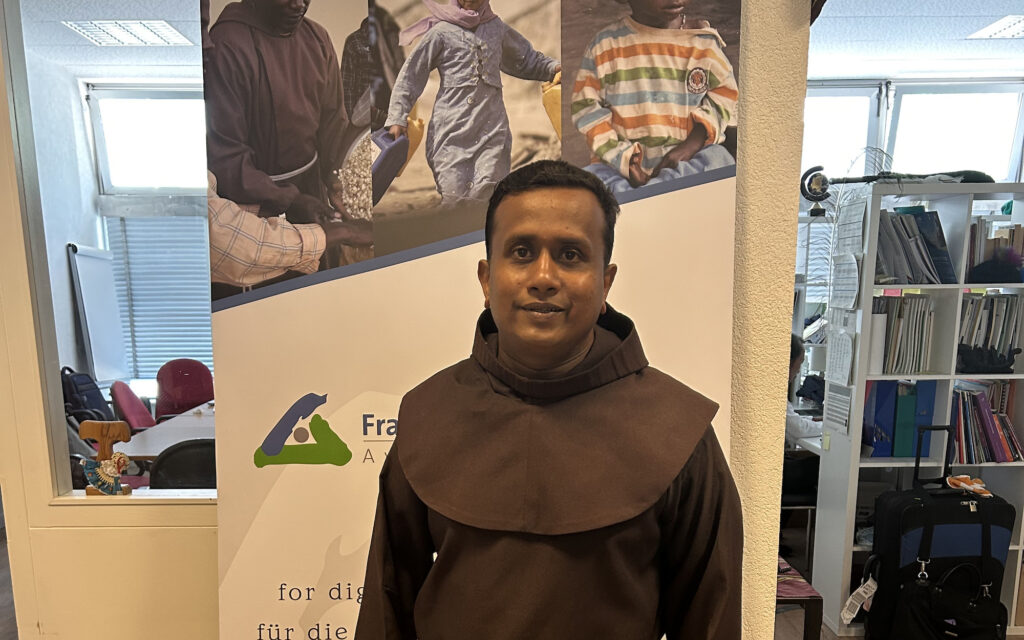Sri Lanka has been marked by long-standing ethnic tensions and clashes. While the civil war ended in 2009, the lack of social cohesion and a failed reconciliation process are still fueling violence. During April 2019’s Easter celebrations, a series of suicide bombings in three churches and three hotels killed over 250 people, which rekindled old grievances. The human rights situation further deteriorated because of an economic crisis that sparked the Aragalaya mass protests, which led to the eviction of then-president Gothabaya Rajapaksa in 2022.
In this context, Brother Patrick Perera is working towards more justice and accountability for the human rights violations that shattered his country. We discussed with him the lack of transitional justice, how the Easter bombings impacted him, as well as his call to the population to unite.
Can you introduce yourself and explain what are the main human rights issues in your country?
My name is Patrick Sujeewa Perera, and I am a priest working for the Justice, Peace and Integrity of Creation (JPIC) Office in Sri Lanka. In the past few years, my country has faced a serious human rights crisis, so I have been engaging in activities to defend people’s rights. The first issue I see stems from Sri Lanka´s three decades of civil war between 1983 and 2009. Given the country’s brutal history, there are still strong tensions between the Sinhalese and Tamil communities. At the same time, mismanagement of the economy by the government and corruption led to an acute shortage of fuel and other necessary supplies, which caused the Aragalaya protests, in which we participated. The third issue is the increasing frequency of extreme weather events such as droughts and floods due to climate change, which are exacerbated because of unsustainable projects in the name of development. Finally, there is a lot of violence against human rights activists.
What inspired you to start this work and how does it connect to your calling as a Franciscan brother?
I started as a volunteer, but at that time I was not sure about what I was doing. It was when I personally witnessed the Easter Sunday attacks and saw people’s remains inside the church that I felt a profound change inside of me. I realized that if some people can do such terrible things against humanity, it is my personal duty to counter this. Even though I don’t expect to live in a world where there is no injustice at all, as a Franciscan, I will do what I can against it. Even now, when I am speaking at the United Nations, I remember that incident. Not only do I pray for the victims, but I raise their voices: I think that this is what my calling is about.
What are you advocating for and why?
We are advocating for more transparency and accountability of the government, which has the lives of ordinary people in its hands. This is especially important if we want to eliminate corruption in the political system. As both religious persons and human rights activists, it is our duty to keep them on the right track. They need to know that somebody is watching. I also think it is important to remind people that they have the power to change things. The Aragalaya protests actually helped with this, because people realized they have the power to protest, and they have the power to hold the government accountable if they are united.
In your work, have you ever felt at risk, especially with the authorities targeting human rights defenders?
With the work I do regarding the Easter bomb attacks, I was reminded many times to be careful with my activities, as we are demanding accountability and justice from the government. I also participated in the Aragalaya protests, where I faced tear gas or water attacks, but that is quite common. So far, I have not received personal threats, but I am still taking precautions to avoid being targeted.
What is your proudest achievement?
What I am proudest of is not something individual, but something we achieved as a group. After the Easter Sunday attacks took place, other religious leaders in the diocese of Colombo such as Archbishop Cardinal Malcolm Ranjith asked for an impartial investigation of this attack, but it did not happen. After this failed, the Cardinal wanted to bring the situation to the international level, but he did not have real tools or mechanisms. At that time, he and the Sri Lankan Catholic Church felt hopeless, as all the victims. It is thanks to the help of Franciscans International that our work at the grassroots was finally brought to the international level. As Franciscans, we have a good reputation, and we are respected – this is a great example of how group unity can be effective.
How do you see the role of Franciscans evolving in Sri Lanka?
We have always been doing charity work, but after the Easter bombings, we started mobilizing people, including other Franciscan groups. Since then, we have not only been doing advocacy by ourselves but have collaborated with the whole Franciscan family, such as the Franciscan Missionaries of Mary or the Capuchin friars. We also have civil society groups engaging with us, especially after the Aragayala protests. On top of that, we are now present at the international level, so if some groups don’t necessarily have access to the UN, we can help them by bringing their advocacy concerns to that level. Finally, the next step I see is discussing how we will keep working together as a family and strategizing on how we advocate to defend human rights.

